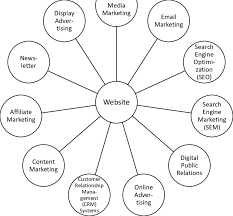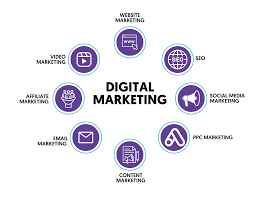The Power of Digital and Social Media Marketing in Today’s Business Landscape
In the digital age, where technology continues to evolve at a rapid pace, businesses are increasingly turning to digital and social media marketing to reach their target audiences effectively. Digital marketing encompasses a wide range of online tactics, such as search engine optimisation (SEO), pay-per-click advertising, email marketing, and content creation, all aimed at boosting brand visibility and driving customer engagement.
Social media marketing, on the other hand, focuses on leveraging social platforms like Facebook, Instagram, Twitter, and LinkedIn to connect with consumers on a more personal level. By creating compelling content and engaging with followers in real-time conversations, businesses can build brand loyalty and foster meaningful relationships with their audience.
The Benefits of Digital and Social Media Marketing
One of the key advantages of digital and social media marketing is its ability to target specific demographics with precision. Through data analytics and insights provided by these platforms, businesses can tailor their messaging to resonate with their ideal customers, resulting in higher conversion rates and improved ROI.
Furthermore, digital marketing offers a level playing field for businesses of all sizes. With the right strategy in place, even small enterprises can compete with industry giants by reaching a global audience at a fraction of the cost of traditional advertising methods.
Engagement and Brand Building
Social media platforms provide an interactive space for brands to engage directly with their customers through likes, comments, shares, and direct messages. By fostering two-way communication and listening to customer feedback, businesses can build trust and credibility within their online community.
Moreover, social media serves as a powerful tool for brand building. Consistent branding across various platforms helps create a recognisable identity that resonates with consumers. By sharing valuable content that aligns with their values and interests, businesses can position themselves as industry leaders and thought influencers.
The Future of Marketing
As technology continues to advance and consumer behaviours evolve, digital and social media marketing will play an increasingly pivotal role in shaping the future of advertising. Businesses that embrace these channels early on stand to gain a competitive edge in an ever-changing marketplace.
In conclusion, digital and social media marketing offer unparalleled opportunities for businesses to connect with their target audience in meaningful ways. By harnessing the power of these platforms through strategic planning and creative execution, brands can elevate their online presence and drive sustainable growth in today’s dynamic business landscape.
Top 22 FAQs on Digital and Social Media Marketing: Understanding the Differences and Strategies
- Is digital marketing and social media marketing the same?
- What are some examples of digital marketing social media marketing?
- What is the difference between digital media and social media?
- What is digital and social media marketing?
- What is digital media and social media?
- What is the 5 3 2 rule for social media?
- What is the role of social media in digital media marketing?
- How do I become a social media digital marketer?
- Which is better social media marketing or digital marketing?
- What is SMMA and how does it work?
- Is digital marketing a good career?
- Which is better digital or social media marketing?
- What is social media and digital media?
- Is digital marketing same as social media marketing?
- What is the difference between a digital marketer and social media marketer?
- Is digital marketing and social media marketing same?
- What are the seven types of digital marketing?
- What is the importance of social and digital media marketing?
- Is digital media marketing the same as social media marketing?
- What are the 4 types of digital marketing?
- Which is Better social media marketing and digital marketing?
- Is Digital Media marketing and social media marketing the same?
Is digital marketing and social media marketing the same?
The distinction between digital marketing and social media marketing lies in their scope and focus. Digital marketing encompasses a broader range of online strategies, including search engine optimisation, email marketing, content creation, and pay-per-click advertising, aimed at enhancing brand visibility and engaging with target audiences across various digital channels. On the other hand, social media marketing specifically leverages platforms like Facebook, Instagram, Twitter, and LinkedIn to interact with consumers on a more personal level through content sharing, engagement tactics, and community building. While both are integral components of a comprehensive marketing strategy, social media marketing is a subset of the broader umbrella term of digital marketing.
What are some examples of digital marketing social media marketing?
In the realm of digital and social media marketing, there are numerous examples that showcase the diverse strategies and tactics used to engage audiences effectively. One common example of digital marketing is search engine optimisation (SEO), which involves enhancing a website’s visibility on search engine results pages through targeted keywords and content optimisation. Social media marketing, on the other hand, encompasses activities like creating engaging posts on platforms such as Facebook, Instagram, and Twitter to build brand awareness and foster customer relationships. Email marketing is another prevalent form of digital marketing, utilised to deliver personalised messages directly to subscribers’ inboxes. These are just a few examples that highlight the versatility and impact of digital and social media marketing in today’s competitive landscape.
What is the difference between digital media and social media?
Digital media and social media are often used interchangeably, but they serve distinct purposes in the realm of marketing. Digital media encompasses all forms of online communication channels, including websites, blogs, email campaigns, and online advertising. On the other hand, social media specifically refers to platforms designed for social interaction and community engagement, such as Facebook, Twitter, Instagram, and LinkedIn. While digital media provides a broad spectrum of online channels for brand promotion and communication, social media focuses on building relationships with audiences through interactive content sharing and real-time engagement. In essence, digital media is the broader umbrella term that includes social media as a subset dedicated to fostering social connections and conversations within a digital landscape.
What is digital and social media marketing?
Digital and social media marketing refer to the strategic use of online platforms and social networking sites to promote products or services, engage with target audiences, and build brand awareness. Digital marketing encompasses a wide range of tactics, including search engine optimisation (SEO), email marketing, and pay-per-click advertising, while social media marketing focuses on leveraging platforms like Facebook, Instagram, Twitter, and LinkedIn to connect with consumers on a more personal level. By utilising these channels effectively, businesses can reach their target demographics with precision, foster customer relationships through interactive engagement, and establish a strong online presence in today’s competitive digital landscape.
What is digital media and social media?
Digital media refers to any type of content that is stored and transmitted electronically, such as websites, videos, images, and audio files. It encompasses a wide range of online platforms and channels through which information can be shared and consumed. On the other hand, social media specifically refers to online platforms that enable users to create and share content with a network of friends, followers, or the public. These platforms facilitate real-time interactions and conversations among users, allowing for engagement and community building. In essence, digital media is the broader umbrella term that encompasses various forms of online content, while social media is a subset of digital media that focuses on social interactions and user-generated content sharing.
What is the 5 3 2 rule for social media?
The 5-3-2 rule for social media is a popular strategy that guides businesses on how to balance their content mix effectively. According to this rule, for every ten posts shared on social media, five should be curated content from others, three should be original content created by the business, and two should be personal or non-business-related posts. This approach aims to maintain a healthy balance between promotional content and engaging material that adds value to the audience’s feed. By following the 5-3-2 rule, businesses can cultivate a more authentic and engaging online presence while fostering stronger connections with their followers.
What is the role of social media in digital media marketing?
Social media plays a crucial role in digital media marketing by serving as a powerful platform for brands to connect with their target audience on a personal level. Through social media channels, businesses can engage in real-time conversations, share valuable content, and build relationships with customers. Social media also amplifies brand visibility, allowing companies to reach a wider audience and drive traffic to their websites. By leveraging the interactive nature of social platforms, businesses can enhance brand awareness, foster customer loyalty, and ultimately boost their overall digital marketing efforts.
How do I become a social media digital marketer?
To become a social media digital marketer, it is essential to start by gaining a strong understanding of digital marketing principles and social media platforms. Consider enrolling in relevant courses or obtaining certifications to build your knowledge and skills in areas such as content creation, social media analytics, and online advertising. Practical experience through internships or freelance projects can also help you develop hands-on expertise in managing social media campaigns and engaging with audiences effectively. Networking with industry professionals and staying updated on the latest trends in digital marketing will further enhance your career prospects as a successful social media digital marketer.
Which is better social media marketing or digital marketing?
The question of whether social media marketing or digital marketing is better is a common one in the realm of digital advertising. While both approaches have their unique strengths and advantages, it’s essential to understand that they are not mutually exclusive but rather complementary strategies. Social media marketing focuses on building relationships and engaging with audiences on platforms like Facebook, Instagram, and Twitter, while digital marketing encompasses a broader range of online tactics such as SEO, PPC advertising, and email campaigns. Ultimately, the effectiveness of each approach depends on the specific goals and target audience of a business. Integrating both social media and digital marketing strategies can create a holistic and impactful online presence that maximises brand visibility and customer engagement.
What is SMMA and how does it work?
Social Media Marketing Agency (SMMA) is a term used to describe a business that specialises in managing social media accounts and marketing strategies on behalf of other companies. SMMA works by creating and implementing tailored social media campaigns to help businesses increase their online presence, engage with their target audience, and drive conversions. These agencies typically offer services such as content creation, community management, paid advertising, and analytics tracking to ensure that clients achieve their marketing goals effectively. By leveraging the expertise of SMMA professionals, businesses can benefit from strategic insights and industry best practices to maximise their social media impact and grow their brand online.
Is digital marketing a good career?
The question of whether digital marketing is a good career choice is one that many individuals ponder in today’s rapidly evolving business landscape. With the increasing importance of online presence and engagement, digital marketing offers a promising career path with ample opportunities for growth and advancement. Professionals in this field have the chance to work on diverse projects, utilise cutting-edge tools and technologies, and make a tangible impact on businesses’ success. Moreover, the demand for skilled digital marketers continues to rise, making it a lucrative and rewarding career option for those passionate about creativity, analytics, and staying ahead of industry trends.
Which is better digital or social media marketing?
When considering the question of whether digital marketing or social media marketing is better, it’s important to recognise that both play distinct yet complementary roles in a comprehensive marketing strategy. Digital marketing encompasses a broad range of online tactics beyond social media, such as SEO, email campaigns, and content creation, aimed at boosting brand visibility and driving conversions. On the other hand, social media marketing focuses on leveraging platforms like Facebook, Instagram, and Twitter to engage with audiences on a more personal level. Ultimately, the effectiveness of each approach depends on the specific goals and target audience of a business. Integrating both digital and social media strategies can maximise reach and engagement, creating a well-rounded marketing campaign that delivers optimal results.
What is social media and digital media?
Social media refers to online platforms and websites that allow users to create and share content with a wide audience. Popular social media platforms include Facebook, Instagram, Twitter, LinkedIn, and YouTube. Digital media, on the other hand, encompasses a broader range of digital channels used for marketing purposes, including websites, search engines, email campaigns, mobile apps, and online advertising. Both social media and digital media play crucial roles in modern marketing strategies by enabling businesses to reach their target audience effectively through engaging content and interactive communication channels.
Is digital marketing same as social media marketing?
The frequently asked question regarding digital and social media marketing is whether they are the same. While digital marketing encompasses a broader spectrum of online tactics aimed at promoting brands and engaging with audiences across various digital channels, social media marketing specifically focuses on leveraging social platforms to connect with consumers on a more personal level. In essence, social media marketing is a subset of digital marketing, highlighting the importance of utilising both strategies in a comprehensive and integrated approach to maximise brand visibility and engagement in today’s competitive online landscape.
What is the difference between a digital marketer and social media marketer?
In the realm of digital and social media marketing, the distinction between a digital marketer and a social media marketer lies in their areas of focus and expertise. A digital marketer typically oversees a broader spectrum of online marketing strategies, including search engine optimisation (SEO), email marketing, content creation, and pay-per-click advertising, with the goal of enhancing brand visibility across various digital channels. On the other hand, a social media marketer specialises in leveraging social platforms like Facebook, Instagram, Twitter, and LinkedIn to engage with audiences through compelling content, real-time interactions, and community management. While both roles are integral to a comprehensive marketing strategy, a digital marketer tends to have a more holistic approach encompassing all online avenues, whereas a social media marketer hones in on cultivating relationships specifically through social platforms.
Is digital marketing and social media marketing same?
The frequently asked question of whether digital marketing and social media marketing are the same is a common misconception in the realm of online advertising. While both strategies fall under the broader umbrella of digital marketing, they serve distinct purposes. Digital marketing encompasses a wide range of online tactics, including search engine optimisation (SEO), email marketing, pay-per-click advertising, and content creation, aimed at promoting brand visibility and engagement across various digital channels. On the other hand, social media marketing specifically focuses on leveraging social platforms like Facebook, Instagram, Twitter, and LinkedIn to connect with audiences on a more personal level through interactive content and community engagement. Understanding the nuances between these two approaches is crucial for businesses looking to develop a comprehensive online marketing strategy that effectively reaches and engages their target audience.
What are the seven types of digital marketing?
In the realm of digital and social media marketing, understanding the seven key types of digital marketing strategies is crucial for businesses aiming to maximise their online presence and engage with their target audience effectively. These seven types include search engine optimisation (SEO), pay-per-click advertising (PPC), social media marketing, content marketing, email marketing, affiliate marketing, and influencer marketing. Each type serves a unique purpose in reaching and engaging with consumers across various online platforms, allowing businesses to tailor their approach based on their specific goals and target demographics. By leveraging a combination of these digital marketing strategies, businesses can enhance brand visibility, drive customer engagement, and ultimately achieve business growth in the competitive digital landscape.
What is the importance of social and digital media marketing?
The importance of social and digital media marketing lies in its ability to reach and engage with target audiences in a highly targeted and cost-effective manner. In today’s digital age, where consumers spend a significant amount of time online, businesses need to establish a strong presence on social media platforms to build brand awareness, drive customer engagement, and ultimately increase sales. By leveraging the power of digital marketing tools and social media channels, businesses can create personalised campaigns that resonate with their audience, leading to improved brand loyalty, customer retention, and long-term success in the competitive marketplace.
Is digital media marketing the same as social media marketing?
The frequently asked question of whether digital media marketing is the same as social media marketing often arises in discussions about online advertising strategies. While both digital media marketing and social media marketing fall under the broader umbrella of online promotion, they serve distinct purposes. Digital media marketing encompasses a range of online tactics, including search engine optimisation, email campaigns, and display advertising, aimed at reaching target audiences across various digital channels. On the other hand, social media marketing focuses specifically on leveraging social platforms like Facebook, Instagram, and Twitter to engage with users through content creation and community interaction. While both are integral components of a comprehensive digital strategy, each plays a unique role in engaging audiences and driving brand awareness in today’s competitive landscape.
What are the 4 types of digital marketing?
In the realm of digital marketing, there are four primary types that businesses commonly utilise to reach and engage their target audiences effectively. These include search engine optimisation (SEO), which focuses on improving a website’s visibility in search engine results; pay-per-click (PPC) advertising, where advertisers pay a fee each time their ad is clicked; social media marketing, which involves creating and sharing content on social platforms to drive audience engagement; and email marketing, a direct communication strategy that delivers tailored messages to subscribers’ inboxes. Each type offers distinct benefits and plays a crucial role in a comprehensive digital marketing strategy aimed at maximising brand exposure and driving conversions.
Which is Better social media marketing and digital marketing?
The debate between social media marketing and digital marketing often arises, with both playing crucial roles in a comprehensive digital strategy. While social media marketing focuses on leveraging social platforms to engage with audiences on a personal level and build brand loyalty, digital marketing encompasses a broader range of online tactics such as SEO, email marketing, and content creation aimed at boosting brand visibility and driving customer engagement. Ultimately, the effectiveness of each approach depends on the specific goals and target audience of a business. Integrating both social media marketing and digital marketing elements can create a powerful synergy that maximises reach and engagement across various online channels, leading to a more holistic and impactful marketing strategy.
Is Digital Media marketing and social media marketing the same?
Digital media marketing and social media marketing are closely related but not the same. Digital media marketing encompasses a broader spectrum of online tactics, including search engine optimisation, email marketing, pay-per-click advertising, and content creation across various digital channels. On the other hand, social media marketing specifically focuses on leveraging social platforms like Facebook, Instagram, Twitter, and LinkedIn to engage with audiences through interactive content and real-time conversations. While both strategies aim to enhance brand visibility and drive customer engagement in the digital space, social media marketing is just one component of the larger digital marketing landscape.





